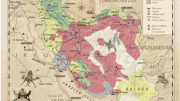Thousands of Iranians marched through the streets Friday to protest Saudi Arabia ahead of the hajj, a sign of soured relations between the two countries following last year’s crush and stampede during the annual pilgrimage.
Iranians won’t be taking part in this year’s hajj, required of all able-bodied Muslims once in their life, over tensions between majority Sunni Saudi Arabia and majority Shiite Iran, regional rivals divided over a host of issues.
Demonstrators waved signs after Friday prayers depicting Saudi King Salman holding a bloody sword, his head wrapped in an American flag and his shirt bearing a blue Star of David similar to that on the Israeli flag.
“Death to Al Saud and the traitors!” protesters in Tehran shouted. State media reported similar protests across the country.
“We don’t have any problems with the people of Saudi Arabia. They are Sunnis and are our brothers,” protester Habibullah Abulfazli said. “But the Al Saud family are puppets of Britain and America. They are fighting proxy wars against Shiites and against all Muslims.”
Tensions soared in January after the kingdom executed a prominent Saudi Shiite cleric. Angry demonstrators later attacked two Saudi diplomatic posts in Iran and Saudi Arabia cut diplomatic ties to the Islamic Republic. The two countries also support opposing sides in the civil wars in Syria and Yemen.
In their recent criticisms, Iranian officials have focused on the Sept. 24, 2015, stampede and crush of pilgrims at last year’s hajj that killed at least 2,426 people, according to an Associated Press count. Tehran has said the disaster killed 464 Iranians.
The official Saudi toll of 769 people killed and 934 injured has not changed since Sept. 26. The kingdom has never addressed the discrepancy, nor has it released any results of an investigation authorities promised to conduct over the disaster.
On Monday, Iran’s Ayatollah Ali Khamenei raised the stakes in the dispute by saying Saudi officials had “murdered” hajj pilgrims who were injured in the stampede. Saudi Arabia’s Grand Mufti Abdulaziz Al Sheikh countered by claiming that Iranians are “not Muslims.”
A member of Lebanon’s Hezbollah meanwhile said the Iran-backed Shiite militant group has asked its members to refrain from going on the hajj this year because of tensions with Saudi Arabia.
The member, who spoke to The Associated Press this week, said the decision came after Saudi Arabia named Hezbollah a terrorist organization. He spoke on condition of anonymity because he was not authorized to speak to the media.
He said the “organizational measures” would only affect Hezbollah members and not their families or the group’s supporters.
Tensions between Saudi Arabia and Iran periodically have simmered and cooled since Iran’s 1979 Islamic Revolution installed its Shiite cleric-ruled democracy. The hajj, which begins Saturday this year, hasn’t been spared.
In 1987, demonstrating Iranian pilgrims on hajj battled Saudi riot police in clashes that killed at least 402 people. Iran claimed 600 of its pilgrims were killed and said police fired machine-guns at the crowd. Iran did not send pilgrims to the hajj in 1988 and 1989, while Saudi Arabia severed diplomatic ties over the violence and Iranian attacks on shipping in the Persian Gulf during the Iran-Iraq War.
Iran has called for an independent body to take over administering the five-day hajj, something the Al Saud family has refused. Its overseeing of Islamic holy sites, along with Saudi Arabia’s oil wealth, gives the kingdom major influence in the Muslim world.
During Friday’s protests, demonstrators also shouted slogans against the U.S. and Britain, long targets of suspicion among Iranian hard-liners. But protesters offered their harshest criticism for Saudi Arabia.
“They have stabbed Muslims in the heart,” protester Zabihullah Pirhayati said.



Be the first to comment at "Iranians protest Saudi Arabia ahead of hajj pilgrimage"